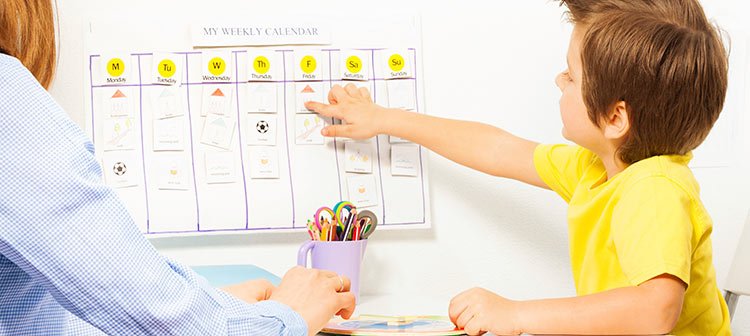
Executive functioning in children refers to working memory, mental flexibility to adapt to changes, and self-regulation. All children have varying levels of these skills and there are no absolute benchmarks. Every child, however, can be helped to develop these skills and eventually only get better with them. To begin with, a supportive environment at school and also at home is very critical to the development of these skills.
First, let’s understand why kids need to develop executive functioning skills?
Let us look at some behaviors kids exhibit when they lack executive functioning skills:
- Having difficulty in prioritizing tasks
- Having difficulty in starting new tasks or completing a task fully. For example, leaving a project mid-way due to boredom
- Panic or stress when faced with changes in routine. For example, not being able to cope with sudden changes in syllabus/ school routine, etc.
- Trouble in moving from one task to another without a change in focus. For example, difficulty in starting math homework right after a game of chess
- Random forgetfulness. For example, forgetting homework, lesson names, etc.
- Difficulty in simple planning. For example, being able to decide how much time a certain task would take
It’s normal to feel that we as adults too are faced with these challenges very often and hence, these aren’t an area of concern. It is also true that many children grow out of these issues on their own as they grow up.
Early intervention and enforcing corrective behaviors could however help your child in a big way. It can remove all the ifs-and-buts and can get them on a faster learning curve. In this article, we at Talentnook recommend some of the simplest to deploy methods for all parents to address executive functioning issues in children.
These 5 easy yet effective methods are based on our extensive experience with children across grades:
1. Biofeedback games for improving self-regulation
Children often have issues with remembering things, controlling impulsive reactions, prioritizing, etc. With computerized games that use neurofeedback to engage children while encouraging self-regulation can do wonders.
Wondering how these games work? These games engage children in fun activities that involve:
- Remembering sequences
- completing patterns
- switching from one task to another
- organizing things by category, and much more
A good example of such a website for neurofeedback games is Mightier: Biofeedback Games for Children. In their own words, Mightier’s games mimic challenges found in everyday life, allowing kids to practice calming skills in a safe, fun environment.
Also read: 5 Best Educational Apps to Supplement Your Child’s Learning
2. Physical activity (engaging in co-operative sports)
The Physical Activity Guidelines for Americans, recommends 60 minutes or more of physical activity for children of ages between 6 to 17 years. Apart from the many health benefits, physical activity also has a significant positive impact on executive functioning in children.
It helps in the following ways in improving executive functioning in children:
- During organized, cooperative sports activities children learn to abide by rules and on-task behavior (self-regulation)
- It enhances their capability to think of different strategies each time they are faced with a new opponent team (dealing with changes)
- It increases their concentration power thereby improving focus in general
- The lesson of keeping ‘sporting spirit alive’ teaches them how to deal with their emotions better
3. Make planning fun (checklists, reminders, etc. with a fun twist!)
Being unable to plan, prioritize or complete tasks is one of the most common problems with executive functioning in children. Some children might find planning as a tedious or an unimportant, forced task. You can mix things up with their areas of interest to make planning and organizing a fun activity. Get started with these simple, effective tricks:
- Switch up boring diaries and planners with fun stuff. For example, does your daughter love unicorns? Get her a unicorn-themed planner!

- Make planning a fun activity, get your child a whiteboard and ask them to create a schedule every day first thing. At the end of the day, review the day plan with your child while praising them for achieved goals
- Encourage planning in all walks of life – start with asking them to plan things they love doing. For example, ask your child to plan the next trip to the mall with as much detail as possible (when would they go, what would they buy, etc.)
4. Hire an executive function coach/tutor for your child
If you hit a roadblock and find yourself out of creative ways, get help! You can hire tutors who provide services specific to executive functioning in children.

An executive functioning skills tutor can help in many ways, we’ve listed down a few, to begin with:
- Help your child plan/prioritize homework
- Teach coping mechanisms for dealing with emotions and uncertain environments
- Help develop reading, analyzing, and information synthesizing skills
- Use tools to enhance information retention and application
- Encourage alternative approaches to problem-solving
- Teach time management, independent decision-making, etc.
To get started right away, just log on to Talentnook.com and get in touch with tutors offering expertise in the executive functioning skills area. Request for demo lessons, check qualifications, read reviews, and choose what works out best for you in terms of cost, timings, and your child’s learning preferences.
5. Do role-plays and reward alternate ways of problem-solving
Children just love and enjoy role plays t! Get them to don an imaginary executive hat and ask them to solve problems.
For example, ask your child to pretend like they are the CEO of a firm sitting in a conference with all the directors. Present their usual math word problems as a statement and ask them to solve not as a math student but as a CEO. How would they approach a problem or do back of the envelope calculations if asked in an office meeting? Encourage your child to think out of the box, get them to try lots of guesstimates, and reward even their wackiest ideas. This always works, and is the best way to mix up play & work, try it to believe it!
Want to learn more about ways to improve executive functioning skills in your child? Or want to explore the option of getting professional tutors to help your child learn to self-regulate and organize? Visit Palo, a life and learning coaching service for kids. Palo coaches work with children to develop executive functioning skills early on in life and gain the advantage that they need to succeed.
Read more articles on Talentnook’s blog for parents and children.